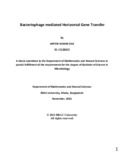Bacteriophage mediated horizontal gene transfer

View/
Date
2021-11Publisher
Brac UniversityAuthor
Das, Arpon KumarMetadata
Show full item recordAbstract
Bacteriophages are viruses which infect and replicates within the bacterial cell. Bacteriophage refers ‘bacteria eater’ that means the bacteriophages kill their host cell because bacteriophage is a bacteria-infecting virus. By using this mechanism and also associated with Horizontal Gene Transfer mechanism, bacteriophages transfer various types genetic material in to the bacterial cells. Horizontal Gene Transfer (HGT) occurs through three well-understood genetic mechanisms which are transformation, conjugation and transduction.
This review paper contains bacteriophages horizontally transfer various types of genetic materials such as antibiotic resistant genes (ARGs), virulent genes, and multidrug resistant genetic materials and also the bacteriophage can be used as therapeutic agent which can be referred as phage therapy. Bacteriophages convert antibiotic susceptible bacteria to antibiotic resistant bacteria through horizontal gene transfer following generalized or specialized transduction. Using broad spectrum antibiotics activate endogenous prophages in multidrug resistant bacteria and as a result, those prophages produce infectious virions. As a result, phage therapy can be used as an alternative to antibiotics to solve this problem. The phage virus is highly specific. This indicates that the phage virus will only infect the targeted bacterial pathogen and would not harm the surroundings. Because of the bacteriophage-mediated virulent genetic transfer to bacterial strains, Bacteriophages are responsible for transforming a non-pathogenic bacterial strain into a pathogenic one.
